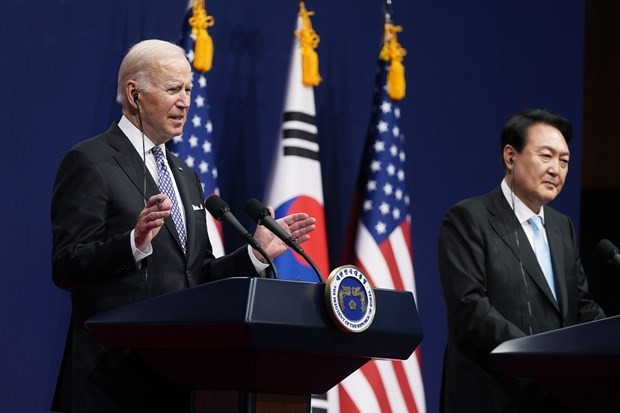On April 24, President Yoon Suk Yeol arrived at Andrews Air Force Base, for a six-day visit to the US. This is the first state visit by a RoK President to the US during the past 12 years.
The fact that the RoK President and the US counterpart met six times in just the past year, shows that the relationship between Seoul and Washington is close and warm, especially as bilateral cooperation continues to grow in many fields. Praising the 70-year achievement of the RoK-US alliance, President Yoon Suk Yeol said, it was ‘the most successful alliance in history’.
Security and the economy are the two main topics in discussions between the RoK President and the US host. President Yoon Suk Yeol’s visit to the US takes place in the context that the security situation on the Korean peninsula is facing many risks of instability. In recent times, Pyongyang has repeatedly conducted missile tests and made tough statements about its ability to respond to large-scale military exercises, between the RoK and the US, as well as the strengthened military alliance between the RoK, the US and Japan.
Negotiations between Washington and Pyongyang have been deadlocked for a long time. Meanwhile, relations between the RoK and the Democratic People’s Republic of Korea (DPRK) on the Korean peninsula, show no signs of improvement and even tensions have increased. In early April, the RoK’s Ministry of Unification said, that the DPRK stopped answering calls from Seoul for several days, both through the inter-Korean communication channel and the military hotline between the two countries. Therefore, the results of many public opinion surveys in the RoK show that the majority of people believe that Seoul needs to strengthen its defence capacity, as well as the assurance from its US ally.
Responding to the RoK’s expectations, the US National Security Council Coordinator for Strategic Communications John Kirby said, that one of the highlights at the US-RoK summit this time, were measures to strengthen security coordination, whereby in case of necessity, the US can mobilise its military capabilities to protect its ally the RoK. The US official stressed that the commitment to protect the RoK is unwavering and Washington is ready to do everything to ensure this commitment.
The visit of President Yoon Suk Yeol is also expected to help resolve disagreements between the two countries in economic relations. The strict conditions of the US Inflation Reduction Act and the Chips and Science Act put RoK businesses at risk of damage. According to public opinion, through dialogues with Washington officials, the RoK government should expand cooperation with the US in high-tech industries, such as artificial intelligence, biotechnology, and aerospace, while minimising the impact of the US-China trade competition.
RoK Prime Minister Han Duck Soo stated, that he hoped President Yoon Suk Yeol’s state visit to the US will bring many practical benefits to future generations. The visit is an opportunity to reaffirm the results of bilateral cooperation over the past time, as well as a turning point to help the two countries move towards a better future, so that future generations continue to feel the benefits of the RoK-US alliance relations, the RoK PM said.
Washington and Seoul established their alliance in October 1953 with a mutual defence treaty, after the RoK and the DPRK signed an armistice. US national security adviser Jake Sullivan stressed that the good relationship between the two countries will facilitate the solving of challenges on the Korean peninsula, as well as the broader scope. The US-RoK alliance has grown far beyond the Korean peninsula, contributing to advancing shared values in the Indo-Pacific and around the world.
















